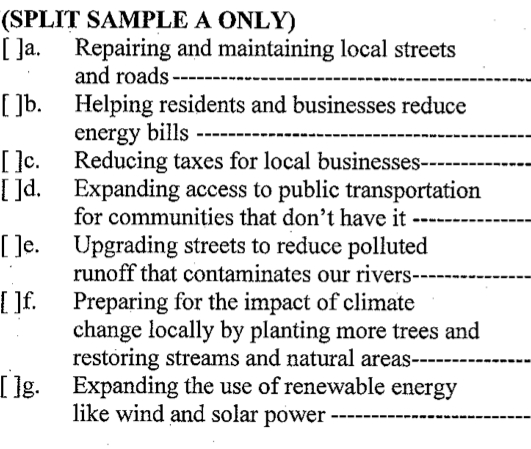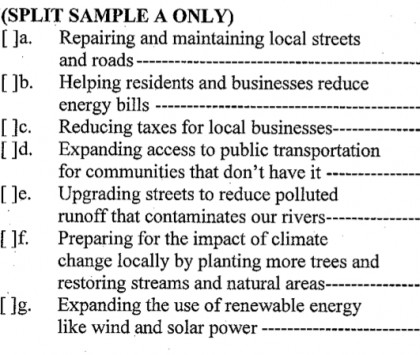“Shall the City increase fees up to three percent on utility reserves and establish a four and a half cent per gallon motor vehicle fee to reduce pollution, conserve energy, improve streets?”
— Question on poll conducted this week by Portland Mayor Charlie Hales.
This morning, the Willamette Week broke the story about a poll performed by Mayor Charlie Hales’ office last night asking Portland residents about their opinions of a potential carbon tax. We’ve followed up with the Mayor’s office to find out what — if anything — the poll questions included about whether or not any new tax revenue would be spent on transportation infrastructure.
Hales’ Communications Director Dana Haynes confirmed the poll, and added that, “The questions are designed to assess the feasibility of a carbon tax, as the mayor and the city explore options for new revenue. While we are a long away from saying “yes” or “no” to a carbon tax, it is our responsibility to think broadly and creatively, regarding ways to be good stewards of the public’s money for services we provide.”
So. What exactly did the poll ask?
The 28 question poll (PDF) was carried out by FM3 Research. It started out by asking whether folks would support or oppose a “small increase in taxes or fees to fund City services.”
The next question addressed the carbon tax idea directly: “Would you support establishing a local tax on carbon pollution to help reduce the impact of climate change?”
The poll conductor then read a potential title of a ballot measure that could potentially include a carbon tax and asked people how they’d vote on it:
“The measure may be entitled, “Establish Carbon Pollution Fee; Improve Air Quality; Energy; and Street” and may read as follows, “Shall the City increase fees up to three percent on utility reserves and establish a four and a half cent per gallon motor vehicle fee to reduce pollution, conserve energy, improve streets?”
In terms of how the new revenue would spent, the City says it would raise $27 million annually and would go to:
- Improving sidewalks and access to public transportation
- Reducing air pollution; and
- Expanding local programs to increase energy efficiency and reduce energy costs for families and businesses.
Given that not everything could be funded, pollsters then asked how respondents would prioritize a list of project types. Here are the project descriptions:


Ironically, given the last post we published about our constant focus on “safety” when discussing bikeway improvements, you’ll not that the only mention of bicycles in this entire poll was accompanied with, “to increase road safety.” It’s also worth noting that there’s no mention of improving bicycle infrastructure in the main explanation of how the money would be spent (nor was there a mention of bicycling in the Willamette Week story). This is likely by design from City Hall. They know all too well that the politics of sidewalks are good and devoid of controversy; however any whiff that this money would be spent on bicycling is likely to generate much more controversy.
That being said, City Hall is too smart to leave bicycle investment out of an idea like this. So even if they don’t say it directly, “access to public transportation” and “reducing air pollution” are both categories where bicycle-specific investments could go.
It’s great to see the City putting out feelers for a new revenue idea and it’s very interesting to see how they frame the idea from the outset. It’s also worth noting that the Oregon legislature, led by Portland Democrat Jules Bailey, is already discussing a carbon tax. We’ll be looking forward to seeing the results of this poll, as the local conversation about how to raise new revenue for transportation (and other services) is set to become a major focus in 2014.
Download the poll yourself to learn more (PDF).

